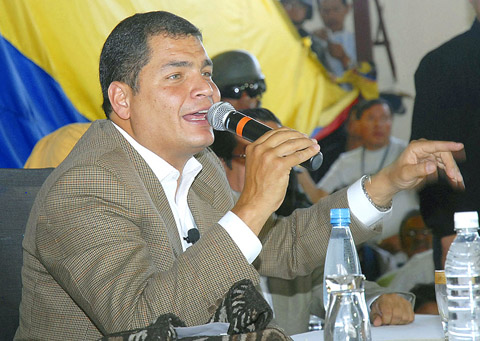Ecuadorian President Rafael Correa said on Saturday he has “no confidence” in the World Bank arbitration branch that is hearing US oil company Occidental’s lawsuit against Ecuador.
Ecuador “handed over its sovereignty” when it signed international accords binding it to the bank’s International Center for Settlement of Investment Disputes (ICSID), Correa said during his weekly radio address.
The ICSID is an autonomous court established to resolve investment disputes.

PHOTO: AP
Los Angeles-based Occidental Petroleum Corp is seeking US$1 billion in damages from Ecuador, alleging its property was confiscated illegally when the Andean nation canceled its operating contract in May 2006.
Occidental, whose production represented about 20 percent of Ecuador’s total output, also is seeking to recover the oil fields.
Ecuador accuses the company of illegally selling 40 percent of its concession to EnCana Corp of Canada without Energy Ministry authorization.
Correa withdrew Ecuador from the Washington-based court in December, but the country is still on the hook for cases pending at the time — including Occidental’s claim.
In a separate case before the court, Ecuador recently reached a settlement with Occidental to return US$100 million in taxes. The company had originally said it was due a US$171 million refund, and Ecuador’s energy minister called the agreement a victory.
On Saturday, Correa assured Ecuadorians that the country will win its pending dispute with Occidental at the court.
He also praised a recent decision by the tribunal to grant Ecuador an extra month to prepare its defense, until June 16.
But still, he said accords giving the court authority over foreign investment disputes are “just another one of the things that Latin America has to change.”
Correa and other critics accuse the court of being beholden to US interests. Bolivian President Evo Morales, a close ally, announced plans to withdraw from the center last year.
Correa suggested that Latin American governments ban all “extra-regional” arbitration to leave space for organizations like the Inter-American Development Bank (IADB) to operate.
He called the IADB — which has extended some US$3 billion in long-term credit to Ecuador for social programs — an “important collaborator.”
Correa took office last January promising to force foreign oil companies to share more of the oil they produce with the state and to cut ties with the World Bank and IMF.
Four months later he kicked the World Bank’s local representative out of the country.

Right-wing political scientist Laura Fernandez on Sunday won Costa Rica’s presidential election by a landslide, after promising to crack down on rising violence linked to the cocaine trade. Fernandez’s nearest rival, economist Alvaro Ramos, conceded defeat as results showed the ruling party far exceeding the threshold of 40 percent needed to avoid a runoff. With 94 percent of polling stations counted, the political heir of outgoing Costa Rican President Rodrigo Chaves had captured 48.3 percent of the vote compared with Ramos’ 33.4 percent, the Supreme Electoral Tribunal said. As soon as the first results were announced, members of Fernandez’s Sovereign People’s Party

EMERGING FIELDS: The Chinese president said that the two countries would explore cooperation in green technology, the digital economy and artificial intelligence Chinese President Xi Jinping (習近平) yesterday called for an “equal and orderly multipolar world” in the face of “unilateral bullying,” in an apparent jab at the US. Xi was speaking during talks in Beijing with Uruguayan President Yamandu Orsi, the first South American leader to visit China since US special forces captured then-Venezuelan president Nicolas Maduro last month — an operation that Beijing condemned as a violation of sovereignty. Orsi follows a slew of leaders to have visited China seeking to boost ties with the world’s second-largest economy to hedge against US President Donald Trump’s increasingly unpredictable administration. “The international situation is fraught

MORE RESPONSIBILITY: Draftees would be expected to fight alongside professional soldiers, likely requiring the transformation of some training brigades into combat units The armed forces are to start incorporating new conscripts into combined arms brigades this year to enhance combat readiness, the Executive Yuan’s latest policy report said. The new policy would affect Taiwanese men entering the military for their compulsory service, which was extended to one year under reforms by then-president Tsai Ing-wen (蔡英文) in 2022. The conscripts would be trained to operate machine guns, uncrewed aerial vehicles, anti-tank guided missile launchers and Stinger air defense systems, the report said, adding that the basic training would be lengthened to eight weeks. After basic training, conscripts would be sorted into infantry battalions that would take

GROWING AMBITIONS: The scale and tempo of the operations show that the Strait has become the core theater for China to expand its security interests, the report said Chinese military aircraft incursions around Taiwan have surged nearly 15-fold over the past five years, according to a report released yesterday by the Democratic Progressive Party’s (DPP) Department of China Affairs. Sorties in the Taiwan Strait were previously irregular, totaling 380 in 2020, but have since evolved into routine operations, the report showed. “This demonstrates that the Taiwan Strait has become both the starting point and testing ground for Beijing’s expansionist ambitions,” it said. Driven by military expansionism, China is systematically pursuing actions aimed at altering the regional “status quo,” the department said, adding that Taiwan represents the most critical link in China’s